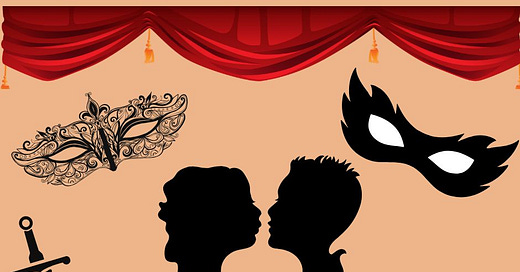And now - A Word From My Sponsor
Brought to you courtesy of The Bard by Joy Ann Ribar, author of Shakespeared-in-the-Park
Whether you love him or crinkle your nose at him, William Shakespeare needs no introduction. Let’s face it: The Bard has been around since the sixteenth century and is in no hurry to be replaced. I mean, who could do it?
You might have heard Shakespeare played around with language like silly putty, flexing it when necessary to fit into the strict iambic pentameter form he used for his plays. Words like “instinctively,” “uncomfortable,” and “undressed” were crafted when the playwright added suffixes or prefixes to words for the right number of syllables.
Here are a few of my favorite words brought to you by The Bard:
Cold-blooded: used in reference to the title character, King John, meaning he lacked emotion. Today, the word has a more sinister connotation and is useful for authors to visualize their villains.
The flash and outbreak of a fiery mind in Hamlet introduces the word outbreak to mean an eruption of thoughts from the character’s mind. Today, outbreak almost always triggers us to think of diseases or weather events, more good plotting fodder for authors.
Swagger is one of my favorites after learning Shakespeare loved it, too, or at least used it in many forms in Henry VI. A derivative of swag, meaning to sway, Will used it to depict insolent or boastful walking. My high school students loved to describe people as having swagger, which they saw as an attribute, having confidence or authority.
Shakespeare used the word suspect a number of times to mean suspicious or suspicion, likely deriving from the Latin word suspectus, meaning mistrusted. The word fitted his plays, which included shady characters. I see mystery authors conjure the word automatically when crafting lists of possible doers of dirty deeds. I included this word in my list because my eleven-year-old grandson, a born skeptic, uses “sus” as his one-word comment about anything he doesn’t believe is true.
With over seventeen-hundred words credited to Shakespeare, I could go on, but I won’t.
However, I can’t discuss Shakespeare’s contributions without including some of my favorite expressions still used in modern times: elbow room, to eat out of house and home, and in a pickle. I ponder these three favorites, wondering: Did Shakespeare live in crowded quarters, feed ungrateful relatives or just teenagers, and did he have a distaste for pickles, since being in a pickle means someone’s in trouble?
Shakespeare’s words and expressions have survived centuries of change and modifications to our English language. Something so enduring, to me, is quite endearing.
When I decided to focus on Shakespeare’s characters and universal themes inherent to mankind, I endeavored to do what Shakespeare did. He brought his plays to the masses, ensuring they were performed in public, not just before the nobles at court. This alone is proof that his works were entertainment for all to enjoy and that one doesn’t need to be a scholar to understand conflict, love, deceit, honor, or revenge.
In Shake-speared in the Park, readers will encounter a modern play where The Bard’s characters gather at a talk show to air their complaints about their forced actions, their fellow characters, and their consciences - all presented at the whim of Shakespeare. While the stage is being prepared for Flourish College’s summer performance in the park, the actors undergo their own drama. Someone is bent on sabotaging the show at the least, seeking murderous revenge at the most.
Like Shakespeare’s settings, Prairie Ridge, the small college community featured in Shake-speared in the Park, has class conflicts and an unsavory history, setting the scene for the twisted plot of the book in which the wealthy founding families are targeted for terror. Join the sisters, literature professor Bay, and ex-con master grifter, Cassandra, as their relationship progresses, and each has a voice in the novel. Bay is a director of the summer production, where crimes and sabotage take center stage. The plot intersects Cassandra’s new position as personal assistant to Posey Hollingsworth, one of the upper crust in Prairie Ridge society.
Just as Shakespeare presented a play within a play in at least five of his works, I borrowed from the great playwright to include more than one type of play in producing this story. Readers will find some characters are playing roles they believe were etched for them while others reject their station and rebel. Somewhere between rebellion and duty, there is love, revenge, deception, loyalty, courage, and power. I hope readers will discover a place for themselves in the storyline. After all, aren’t we all actors at times, playing out scenes, performing when called upon, sometimes playing the supporting role, sometimes grabbing the spotlight when opportunity allows?
Joy Ann Ribar is an RV author, writing on the road wherever her husband and their Winnebago View wanders. Joy’s cocktail of careers includes news reporter, paralegal, English educator, and aquaponics greenhouse technician, all of which prove useful in penning mysteries. She loves to bake, read, research wines, and explore nature. Joy’s writing is inspired by Wisconsin’s four distinct seasons, natural beauty, and kind-hearted, but sometimes quirky, people. Joy holds a BA in Journalism from UW-Madison and an MS in Education from UW-Oshkosh. Two of her Deep Lakes mysteries were recognized by Chanticleer Cozy and Not-So-Cozy mystery awards. The Medusa Murders received 2nd Place in the Book Fest awards for Women’s Fiction/Mystery.
You can find out more about Joy by visiting her website www.joyribar.com, or by visiting the Blackbirds site. Or click here to read her last post and buy her books here.






